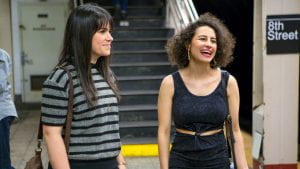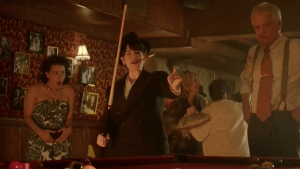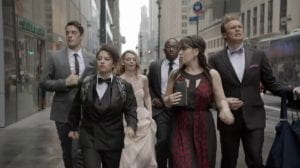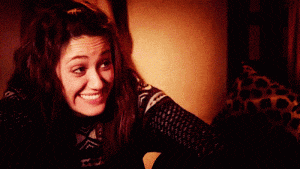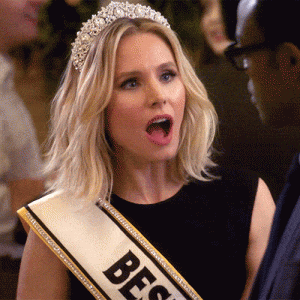Annotated Bibliography
Philippe Lamarche
Callanan, Valerie J. “Media Consumption, Perceptions of Crime Risk and Fear of Crime: Examining Race/Ethnic Differences.” Sociological Perspectives 55.1 (2012): 93-115. ProQuest. Web. 20 Sep. 2018.
This peer-reviewed article aims to answer two main questions: 1) how do different types of crime-related media affect fear of crime, and 2) does media-related fear of crime differ for different ethnic and racial groups? The study used well-researched assessments to determine perception of neighborhood crime risk and the fear of crime, and then looked to see if there were trends regarding race/ethnicity. The survey’s results determined that fear of crime is higher in victims, women, blacks, and Latinos, and that it is negatively associated with education, age, and income. It also, however, concluded that crime drama television had little to no impact on fear of crime. This source is meaningful to our research because it goes in depth on how the portrayal of violence and crime on television can affect society, thus emphasizing the importance of the portrayal of women on television. However, it is inconclusive as to whether victimization of women in crime dramas actually influences their fear of crime.
Cavender, Gray, and Nancy C. Jurik. “Policing Race and Gender: An Analysis of “Prime Suspect 2″.” Women’s Studies Quarterly 32.3 (2004): 211-30. ProQuest. Web. 20 Sep. 2018.
This article dives into a particular episode of the television series called Prime Suspect, a crime drama featuring a London policewoman Jane Tennison, with the objective of discussing how it handles race and gender. The show first aired in 1991 and was taken off air in 2006, placing it during third wave feminism. After 3 in-depth observations of Prime Suspect 2, the researchers concluded that although this film features a prominent female protagonist, it fails in promoting ideals of gender and racial equality. This article introduces us to and dissects a good example of a show that attempts to take a feminist stance by including a female lead in a male-dominated profession. Despite this, the show errs more on the side of post-feminist depictions of women; Jane Tennison’s strength and determination leave her alone and unlikable. Despite its failure at promoting feminism, this show also serves as an exception to prove the rule: crime dramas with female leads are few and far in between, and even those that exist don’t always uphold feminist values.
Sommers, Zach. “MISSING WHITE WOMAN SYNDROME: AN EMPIRICAL ANALYSIS OF RACE AND GENDER DISPARITIES IN ONLINE NEWS COVERAGE OF MISSING PERSONS.” Journal of Criminal Law & Criminology 106.2 (2016): 275-314. ProQuest. Web. 20 Sep. 2018.
This article is an attempt at measuring the accurateness of the Missing White Woman Syndrome. Missing White Woman Syndrome is the cultural phenomenon where white women and girls are reported missing more than any other group of Americans. The authors discovered that the disparity in coverage is indeed true, and this was accomplished by looking at FBI data and data from 4 online news sources. Statistical analysis was used to prove that both women and white persons were overrepresented as missing, thus it was concluded that white women were overrepresented as well. Although the article does not dive into why this is the case, we can hypothesize that this is the case because women are often portrayed as needing saving (i.e. damsel in distress). Regardless of the reason, it reinforces the idea that women on television are heavily associated with being victims. Even in the news, women are disproportionately shown as victims when compared to men, spurring the belief that women are more helpless and in need of defending.
Costanza, Justine Ashley. “Sexist Portrayals Of Women Still Dominate Prime Time TV: Study.” International Business Times. IBT Media Inc, 15 Nov. 2012. Web. 21 Sept. 2018.
This article comes from an online newspaper, and it discusses the rampant sexism still present in the entertainment industry. It brings up the fact that even though things are improving and women are getting more and more involved in the production of television, there are clear inequalities. Costanza argues that we still see a lot of stereotypes on television that we think have been left in the past, like a female character’s worth being tied completely to her relation to a man. She also strongly emphasizes that objectification and sexualization of women is very present and negatively affects general female audiences. Although this article doesn’t specifically talk to women being portrayed as victims, it can be implied that this portrayal is also a result of sexism in the industry. Adding to this source’s value is that it speaks to the current state of the television industry and suggests that unless women become more empowered in the television industry, female characters will continue to be victimized and portrayed negatively.
Hains, Rebecca C. “The Problematics of Reclaiming the Girlish: The Powerpuff Girls and Girl Power.” Femspec 5.1 (2004): 1. ProQuest. Web. 20 Sep. 2018.
First, this article introduces “girl power” as a part of the contemporary movement and discusses the idea behind the movement: women and strong are not mutually exclusive. It also argues, on the other hand, that embracing “girl power” is to shift focus back on femininity and to a toxic obsession over looks. The author here looks at the Powerpuff Girls and analyzes its themes of girl power versus feminism. She argues that the show has a complicated tendency to portray women both progressively and regressively. The show embraces the idea that girls can be both cute and strong at the same time; that women and girls aren’t restricted to being just one or the other. However, this message ends up being very specific to race, class, and size. The message that girls can be anything ends up being represented only by white, middle class, attractive girls. Consequently, the show suggests that if you are not these things, you cannot be a powerful girl. This article can be used as an example of a television show with strong, female protagonists but who unsuccessfully try to empower girls as a whole. It supports the observation that lack of victimization of women does not necessarily mean that it upholds feminist ideals.
Park, Jaeyoon. “The Unruly Woman in FX’s Justified.” Americana : The Journal of American Popular Culture, 1900 to Present 13.2 (2014)ProQuest. Web. 20 Sep. 2018.
This article focuses on the FX Series Justified, and like a few others, looks in-depth at a show with complicated pre-feminist and pro-feminist ideals. The author focuses on two central female characters who exhibit pro-feminist qualities but are limited by their pre-feminist conditions in an isolated society where the patriarchy is prominent. This setting can be explained by the show’s plot taking place in the heart of the Appalachia, assumed to be a culturally backward region. One of the main female characters is an unruly working-class woman who kills her repeatedly abusive husband, and typically lives as she wants, without falling into the usual female tropes. She refuses to be treated unfairly by men, and she is untamable. The other character however, despite being the leader of a marijuana ring and exercising power of many people, is held back by her vulnerability and motherhood. This show, and the author’s analysis of it, depict a different kind of victimization: these two women who embody many pro-feminist ideals, are essentially victims of the pre-feminist culture they live in. This victimization may not look the same as victimization in the face of physical violence, but the effect is the same: they are restricted as women and as people. To add to this show’s credit and relevance, Justified also succeeds in representing working-class women, who are usually neglected in favor of middle-class women.






